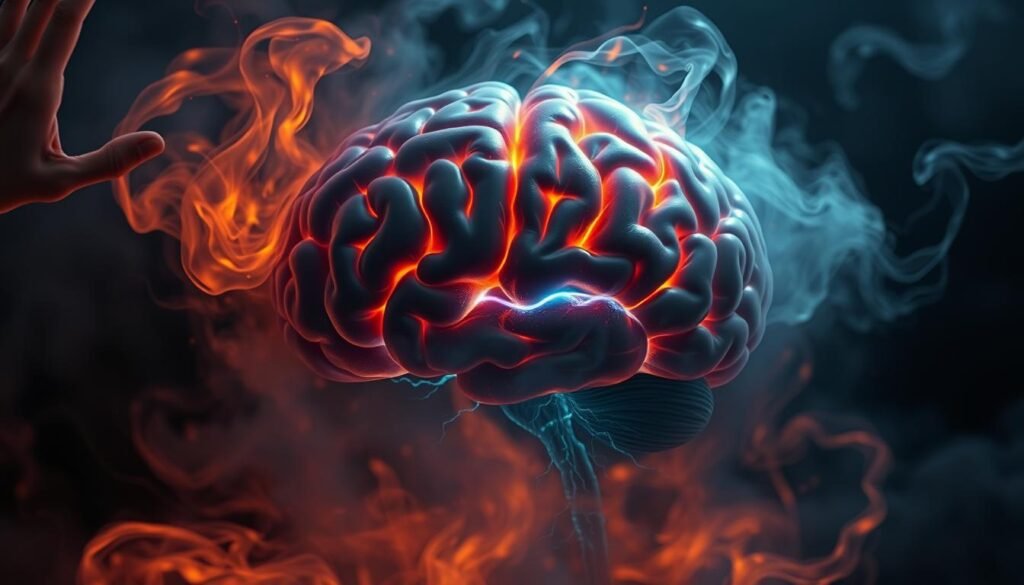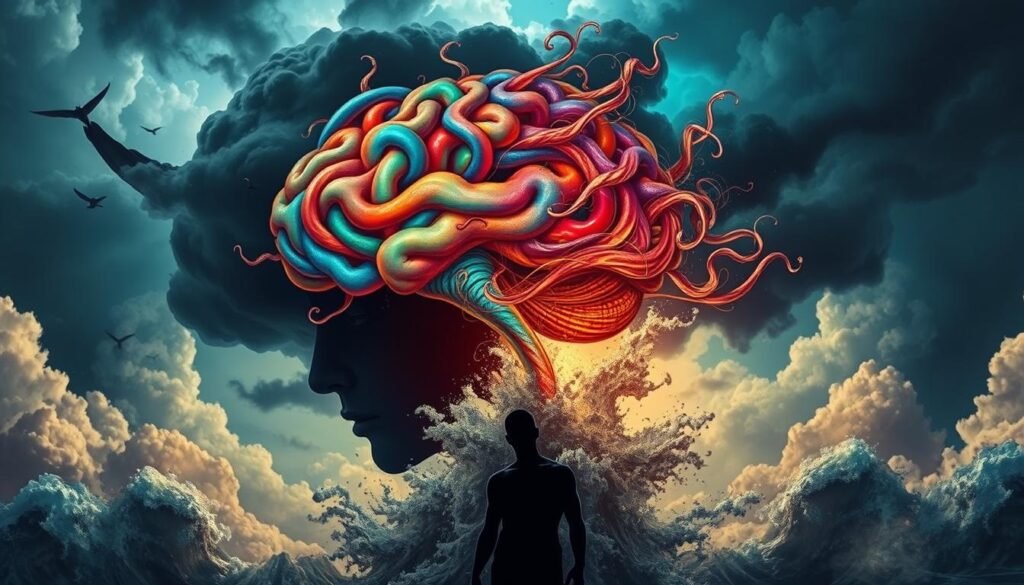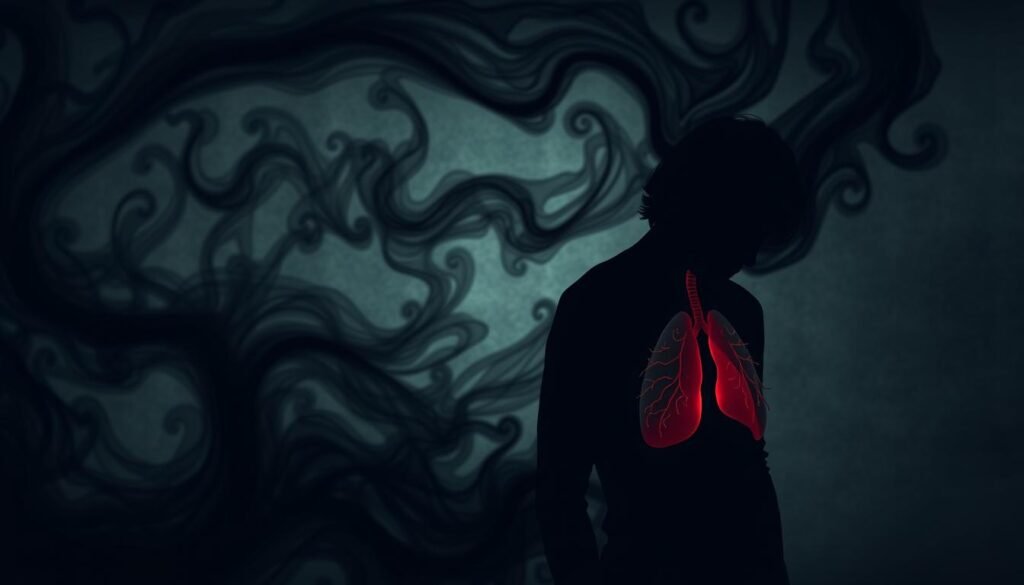Nearly two out of three people dealing with depression feel more aches and pains. This fact shows how deeply depression affects not only the mind but the body too. In the U.S., around 17 million adults suffer from depression. It is not just about feeling sad for a short time. Depression is a severe mood disorder that hurts both our minds and bodies. Knowing the effects of depression on the brain and body is key today. More people are facing mental health challenges than ever before.
When someone is depressed, their body goes through big changes. This includes how their brain is structured and how neurotransmitters work. These changes can mess with how we think, feel, and can even make us more likely to get sick. The link between our mental and physical health is tricky. Yet, it’s critical to understand for better treatment results.
Key Takeaways
- Two out of three individuals with depression may experience increased physical pain.
- Depression can disrupt brain functions and alter neurotransmitter levels.
- Long-term depression may lead to significant brain changes, particularly in the hippocampus.
- Managing depression effectively can improve quality of life and health outcomes.
- Common treatments include medication, therapy, and lifestyle changes.
Understanding Depression and Its Impact
Understanding depression means seeing how it deeply affects a person’s life. In the U.S., about 17 million adults have major depressive disorder (MDD). This condition is complex due to many contributing factors. These include our genes, our environment, and important biological processes. Especially, it’s about how serotonin, a brain chemical, acts oddly in people with depression.
Studies link major depressive disorder to less gray matter in the brain. This shows how vital it is to understand depression’s long-term brain effects. People with depression often have more brain inflammation. This is shown by abnormal levels of a specific protein. Such inflammation can harm both mental and physical health.
Depression’s effects go beyond just feeling sad. Symptoms like losing interest in activities, feeling very tired, and having thoughts of suicide can last for weeks. People with depression may struggle to remember happy moments yet easily recall sad ones. This problem with memory highlights how key it is to address depression’s root causes. Treatments include antidepressant medications and therapy that aims to normalize serotonin levels.
Finally, truly getting depression helps in managing it better. Treatments need to tackle both the emotional and biochemical parts of depression. This is crucial for helping individuals move towards recovery.
How Depression Affects the Brain and Body
Depression changes the brain, affecting how we think and feel. Studies show that depression causes many brain changes. These changes can last a long time and affect mental health. The brain’s gray matter gets smaller, especially in areas for memory and feelings, like the hippocampus and prefrontal cortex. Knowing about these changes helps us understand depression better.
The Physical Changes in the Brain
Depression often leads to less gray matter in the brain. Those with long-term depression might have fewer connections in key brain areas. This affects thinking and feelings. Changes in brain signals make these issues worse. This shows the need for treatments that work well.
Neurotransmitter Disruptions
Neurons talk to each other through neurotransmitters, important for mood and feelings. Not just norepinephrine and serotonin, but also glutamate and GABA, are key in depression. Stress increases cortisol, messing up neurotransmitters. This can break neuron connections, making depression harder to handle. Learning more about these links can help find better treatments.
Brain Regions Affected by Depression
Depression changes many parts of the brain. This affects how we feel and think. Knowing these changes helps us understand depression’s impact on mental health.
The Role of the Hippocampus
The hippocampus is key for learning and memory. People with depression often have gray matter shrinkage here. This can make it hard to remember things.
This shrinkage can block the brain’s ability to keep information. This makes the struggles of those with depression even harder. Studies show smaller hippocampal sizes are linked to more severe depression symptoms. Spotting and treating depression early is important.
Changes in the Prefrontal Cortex
The prefrontal cortex is crucial for complex thinking and managing emotions. People with major depression usually see a size reduction in this part. They also have less activity in certain areas, like the dorsolateral and dorsoventral spots.
This leads to problems thinking clearly and stabilizing emotions. So, finding good treatment methods is key. Knowing the causes, such as genetics, brain chemicals, and life events, is essential. For more info, check this guide on depression triggers.
| Brain Region | Impact of Depression |
|---|---|
| Hippocampus | Gray matter shrinkage leading to memory impairments |
| Prefrontal Cortex | Reduced volume affecting decision-making and emotional regulation |
Brain Inflammation and Depression
Studies show a complex link between brain inflammation and depression. This link comes from high levels of neuroinflammation in people with long-term depression. Such inflammation can harm neurons and affect the brain’s ability to change and form new connections.
Inflammation is common in various chronic conditions linked to depression. Individuals with depression often have higher inflammatory markers like C-reactive protein compared to those without. This systemic inflammation can make depressive symptoms worse and complicate treatment, as some patients don’t respond well to standard antidepressants.
Chronic inflammation is also associated with mood disorders, including Major Depressive Disorder and Atypical Depression. Understanding neuroinflammation’s role in these disorders opens doors to new treatments focusing on inflammation. Tackling the root inflammatory causes may offer better ways to reduce depressive symptoms and boost well-being.

| Inflammatory Marker | Association with Depression | Clinical Relevance |
|---|---|---|
| C-reactive protein (CRP) | Significantly higher in depressive patients | Indicator of systemic inflammation |
| Interleukin-6 (IL-6) | Elevated levels in depression | Associated with mood regulation |
| Tumor necrosis factor-alpha (TNF-α) | Increased in many depression cases | Inflammatory cytokine linked to mood disorders |
| Interleukin-10 (IL-10) | Higher levels observed in depressive individuals | Potential role in anti-inflammatory response |
| Interleukin-12 (IL-12) | Elevated in patients with depression | Linked to immune system activation |
Focusing on brain inflammation could change how we treat depression. It points to the need for treatments that address both neurological and inflammatory factors.
Effects on Cognitive Capabilities
Depression greatly affects how we think. It causes problems with memory and focus. People with depression find it hard to remember things they’ve learned. They also struggle to stay focused on tasks. These issues are due to changes in the brain and chemical imbalances. These changes have a big impact on daily life.
Memory Impairments
Many people with depression have trouble with their memory. They find it hard to remember good times and focus more on the bad. Studies show there’s a link between feeling upset and having memory problems. But understanding these issues can help find the right treatment. For more insights on how depression affects thinking, check out this resource.
Concentration Difficulties
Concentration issues are common in depression. It’s hard for affected individuals to follow conversations or read without losing focus. This often leads to them feeling upset and not good enough. Trouble in processing negative info makes focusing even harder. Knowing about these issues is crucial for getting better.
Influence of Stress Response on Depression
Stress and depression are closely linked, showing how long-term stress affects our mental health. High levels of cortisol, caused by stress, play a big part in starting symptoms of depression. When we face constant stress, our bodies release cortisol. This can cause big changes in our mood.
This increase in hormones can disrupt how we control our emotions, making us more likely to worsen our depression.
High Cortisol Levels
People under a lot of stress often have high cortisol levels. This hormone is tied to both emotional ups and downs and health issues. Research shows that nearly 70% of people with severe depression have problems with the system that controls cortisol.
This can make the body too alert and lead to more trouble in managing emotions, which makes depression symptoms stronger.
Emotional Regulation Challenges
Handling emotions becomes harder with stress, especially for those with depression. People may overreact to normal stress because it’s tougher to manage their feelings. This creates a vicious circle where stress makes depression worse, which is hard to stop.
Activities like exercise or mindfulness could help break this cycle. Yet, knowing how stress affects us is key to better long-term control.

Sleep Disturbances Linked to Depression
Sleep disturbances often go hand in hand with depression. Many people with major depressive disorder battle insomnia. This includes trouble falling asleep, staying asleep, or not feeling rested. The link between depression effects and sleep patterns is a cycle. Poor sleep can start or make depressive symptoms worse, just as a depressed mood can disrupt sleep.
About 88% of people with major depressive disorder have insomnia. Meanwhile, hypersomnia affects around 27% of these individuals. This shows the complex ways depression affects sleep. People might have insomnia, hypersomnia, or both. Those with insomnia are three times more likely to get major depressive disorder.
Studies show that those with depression often see changes in their REM sleep. They may enter REM sleep quicker and spend more time in it. Also, their sleep patterns can be disturbed, with rapid eye movements happening more during REM sleep. About 75% of depressed individuals have trouble sleeping well. This badly affects their everyday life.
Frequent waking up and difficulty getting back to sleep are common for many. Stress can make sleep even harder. While depression meds can help with mood, they don’t always improve sleep. Cognitive behavioral therapy for insomnia can make sleep better. It may also help people recover from depression. Treating sleep disturbances is key to dealing with depression effectively.
| Sleep Disturbance | Prevalence in Depressed Patients | Relationship to Major Depressive Disorder |
|---|---|---|
| Insomnia | Up to 88% | Significant relationship; 3x higher risk for depression |
| Hypersomnia | 27% | More common in atypical depression; 40% in young adults |
| Overall Sleep Difficulties | 97% | Linked to poorer quality of life in patients |
| Increased REM Sleep | Common finding | Indicates altered sleep architecture |
| Cognitive Behavioral Therapy | Recommended treatment | Improves sleep and depression outcomes |
Physical Health Consequences of Depression
Depression doesn’t just affect our emotions. It can also harm our physical health. People with depression may face issues with their heart and digestive system. These problems show up as physical symptoms. Knowing how depression and physical health are linked helps in treating both.
Impact on Heart Health
Depression and heart health are closely connected. Those with depression are more at risk of heart diseases. This is due to the stress and anxiety felt during depressive episodes. Two-thirds of depressed people report more aches and pains, like chest pain.
This pain can make heart problems worse or cause new ones. Depression leads to high blood pressure and bad lifestyle choices. Both of these make heart problems more likely.
Effects on Digestive System
Depression can hurt your digestive health, too. You might experience nausea, bloating, or changes in bowel habits. Depression can cause weight loss from not eating or weight gain from eating too much. These changes can increase stress and discomfort.
Understanding depression’s effect on digestion is important. This knowledge can improve treatment strategies. For more information on how depression affects physical health, check out this source.

Treatment Options for Depression
There are many ways to treat depression that focus on both the mind and body. Things like antidepressants, therapies such as CBT, and changes in lifestyle are key. It’s crucial to find the right mix of these methods to really help improve someone’s mental health and happiness.
Antidepressants and Their Effects
Antidepressants help by fixing the balance of certain brain chemicals. SSRIs, like citalopram and sertraline, are often used first. They can take a month or two to work fully. SNRIs such as duloxetine work on serotonin and norepinephrine. While effective, some antidepressants can cause more side effects. Also, there’s a strong warning with all antidepressants about the risk of increased suicidal thoughts in young people.
Cognitive Behavioral Therapy (CBT)
CBT is a key therapy for tackling depression. It involves sessions where patients work on changing negative thoughts and actions. It helps in controlling emotions and provides ways to handle depressive feelings. Now, with teletherapy, people can have these sessions online, making it easier to get help.
Alternative Treatments and Lifestyle Changes
Making changes in your daily life can boost your fight against depression. Exercise is a great way to lift your mood and reduce depression symptoms. Adding meditation and eating healthy also play a big part. These steps, along with medication and therapy, make for a full approach. They help build better habits and improve life overall.
| Treatment Type | Examples | Main Focus | Time to Effect |
|---|---|---|---|
| Antidepressants | SSRIs, SNRIs, Atypical | Neurotransmitter balance | 4-8 weeks |
| Cognitive Behavioral Therapy (CBT) | Teletherapy, In-person sessions | Changing thought patterns | Varies by individual |
| Lifestyle Changes | Exercise, Meditation, Diet | Holistic lifestyle improvement | Immediate to gradual |
Conclusion
Understanding depression is key to fighting its impact on the mind and body. Nearly 2-8% of adults face major depressive disorder. This condition leads to about half of adult suicides. It’s important to understand how serious this issue is.
Depression changes the brain and makes thinking hard. Knowing how to manage these changes is crucial. There are many ways to treat depression.
Holistic treatment looks at the whole picture for mental health. It combines different therapies. For example, antidepressants, cognitive behavioral therapy, and regular exercise. These help fight depression’s negative effects on the brain. They also improve life quality and build resilience against future bouts of depression.
It’s vital to see how depression affects both mind and body. Also, its impact on thinking and feelings over time. With the right mental health strategies, people can take back control of their lives. They can also gain a deeper understanding of their condition.